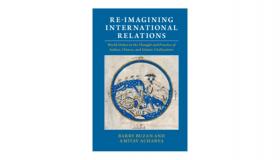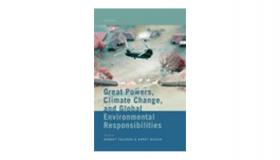
Breadcrumbs navigation
The latest in IR - winter book round up
Welcome to our quarterly book round up. Each quarter we bring you updates on the latest International Studies releases by BISA members. To be included in the next update contact Communications Manager, Chrissie Duxson: Chrissie.Duxson@bisa.ac.uk
Constituting the Political Economy of the Kurds
Social Embeddedness, Hegemony and Identity
Omer Tekdemir

Omer Tekdemir is Lecturer in Political Economy at Coventry University London. He is a co-editor of the open-access journal, New Middle Eastern Studies. In addition to being a BISA member, Omer is a co-convener of the International Studies of the Mediterranean, Middle East and Asia Working Group (ISMMEA).
Blurb
The book argues that the emergent Kurdish socio-economic and political organization in the region constitutes an alternative model to the liberal economic and conventional nation-state-centric understanding of the Middle East. Recently, Kurdish transnational political agents have become a regional power and gained international attention worldwide after their considerable progress in designing new power structures within Iraq and Syria. Indeed, the struggle of Kurdish political actors has played, and continues to play, a crucial role in the development of new social movements and political mobilizations in the public sphere following the remarkable changes triggered by the 'Arab Spring’ and 'Rojava Revolution.' The book focuses on the historical trajectory and the contemporary developments of the Kurds in Turkey by examining the ontology of the Kurdish society (the world’s largest ethnic group without their own nation-state) and the ‘Kurdish question’ that has become one of the big challenges in Turkey’s social, economic and political life.
You can purchase the book from the Routledge website.
Re-imagining International Relations
World Orders in the Thought and Practice of Indian, Chinese, and Islamic Civilizations
Barry Buzan and Amitav Acharya

Barry Buzan is Emeritus Professor of International Relations at the LSE (formerly Montague Burton Professor); honorary professor at Copenhagen, Jilin, and China Foreign Affairs Universities; a Senior Fellow at LSE Ideas; and a Fellow of the British Academy.
Blurb
Buzan and Acharya challenge the discipline of International Relations to reimagine itself in the light of the thinking about, and practice of, international relations and world order from premodern India, China and the Islamic world. This prequel to their 2019 book, The Making of Global International Relations, takes the story back from the two-century tale of modern IR, to reveal the deep global history of the discipline. It shows the multiple origins and meanings of many concepts thought of as only modern and Western. It opens pathways for the rest of the world into this most Eurocentric of disciplines, encouraging them to bring their own histories, concepts and theories with them. The authors have written this book with the hope of inspiring others to extend these pathways by bringing in a wider array of cultures, and exploring how they thought about and acted in worlds composed of multiple, independent, collective actors.
You can purchase the book from the Cambridge University Press website.
Great Powers, Climate Change, and Global Environmental Responsibilities
Edited by Robert Falkner and Barry Buzan

Robert Falkner is Associate Professor of International Relations and the Research Director of the Grantham Research Institute on Climate Change and the Environment, London School of Economics and Political Science. Barry Buzan is Emeritus Professor of International Relations at the LSE (formerly Montague Burton Professor); honorary professor at Copenhagen, Jilin, and China Foreign Affairs Universities; a Senior Fellow at LSE Ideas; and a Fellow of the British Academy.
Blurb
This book is the first of its kind to examine the role of great powers in the international politics of climate change. It develops a novel analytical framework for studying environmental power in international relations, what counts as a great power in the environmental field, and what their special environmental responsibilities are. In doing so, the book connects International Relations (IR) debates on power inequality, great powers and great power management, with global environmental politics (GEP) scholarship.
The book brings together leading scholars in IR and GEP whose contributions focus on major environmental powers (United States, China, European Union, India, Brazil, Russia) and international institutions and issue areas (UN Security Council, multilateral environmental agreements, international climate leadership, coal politics). The contributors to this volume examine how individual great powers have responded to the global climate challenge and whether they have accepted a special responsibility for stabilizing the global climate. They place emerging discourses on great power responsibility in the context of wider debates about international environmental leadership and climate change securitization. And they provide new insights into how international power inequality intersects with the global ecological crisis, and what special role great powers could and should play in the international fight against global warming.
You can purchase the book on the Oxford University Press website.
If you're a BISA member and you'd like your book included in next quarter's round up, email Communications Manager, Chrissie Duxson: Chrissie.Duxson@bisa.ac.uk. Please include the title, blurb and a link to where the book can be purchased. If you are able, you can also include details of any discount available, but of course this is not required. The book should have been published a maximum of six months prior to your email.
Top photo by Phil Hearing on Unsplash